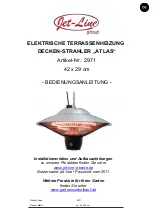
18
Gas pIpInG
Make sure gas supplied is same type listed on model rating plate.
The inlet gas pressure must not exceed 14 inch water column (3.5
kPa) for natural and propane gas (L.P.). The minimum inlet gas
pressure shown on rating plate is that which will permit firing at
rated input.
All gas piping must comply with local codes and ordinances or with the
National Fuel Gas Code (ANSI Z223.1/ NFPA-54). Copper or brass
tubing and fittings (except tin lined copper tubing) shall not be
used.
If the gas control valve is subjected to pressures exceeding 1/2 psi
(3.5 kPa), the damage to the gas control valve could result in a fire
or explosion from leaking gas.
If the main gas line Shut-off serving all gas appliances is used, also
turn “off” the gas at each appliance. Leave all gas appliances shut
“off” until the water heater installation is complete.
A gas line of sufficient size must be run to the water heater.
Consult the current edition of National Fuel Gas Code
(ANSI Z223.1/NFPA 54) and your gas supplier concerning pipe
size.
There must be:
• A readily accessible manual shut off valve in the gas supply line
serving the water heater, and
• A sediment trap (drip leg) ahead of the gas control valve to help
prevent dirt and foreign materials from entering the gas control
valve.
• A flexible gas connector or a ground joint union between the shut
off valve and control valve to permit servicing of the unit.
Be sure to check all the gas piping for leaks before lighting the
water heater. Use a soapy water solution, not a match or open
flame. Rinse off soapy solution and wipe dry.
condensate pIpInG
This water heater is a condensing unit and requires a drain to be
located in close proximity to allow the condensate to drain safely.
The condensate drains from the unit at the exhaust tee located at
the bottom of the unit (see figure 12). Condensate from this water
heater is mildly acidic. Please note that some local codes require
that condensate is treated by using a pH neutralizing filter prior to
disposal.
Caution must be used to ensure that the drain is free and clear of
debris and will not allow backflow through the condensate hose.
Consideration must be given to avoid freezing of the condensate
lines which could result in excessive build up of condensate inside
the water heater. Waterproof heat tape may be required to prevent
freezing of the condensate
lines. Please ensure that the outlet of the
condensate drain does not create a slippery condition which could
lead to personal injury.
CONDENSATION WARNING: THIS WATER HEATER IS A
CONDENSING UNIT AND REQUIRES A DRAIN TO BE LOCATED
IN CLOSE PROXIMITY TO ALLOW CONDENSATE TO DRAIN
SAFELY. THE CONDENSATE DRAINS FROM UNIT AT THE
EXHAUST ELBOW LOCATED AT BOTTOM OF UNIT. NOTE:
IT IS IMPORTANT THAT THE CONDENSATE HOSE NOT BE
ELEvATED ABOvE THE EXHAUST ELBOW, SEE FIGURE 12.
CONDENSATE BUILD-UP WILL BLOCK THE EXHAUST OUTLET,
WHICH WILL CAUSE IMPROPER OPERATION.
fIGure 12
the condensate drain line must be routed to a suitable drain. If
no floor drain is available or the drain is above the level of the
condensate line, install a condensate pump that is resistant
to the acidic condensate. these pumps are available from
local distributors. If the pump is not resistant to acidic water,
a condensate neutralizer must be used ahead of the pump.
when installing the drain line, note the following:
• Plastic pipe or tubing must be used to connect the condensate
drain to a suitable drain or condensate pump. Do not use copper
tubing, iron, or steel pipe for the condensate drain line.
• Condensate drain lines should be installed in conditioned
areas only. Drain lines installed in areas that are subject to
freezing temperatures should be wrapped with a nationally
recognized/listed heat tape and/or approved insulation for
freeze protection. Install per manufacturer’s instructions.
• Do not common drain with the temperature and pressure relief
valve or the condensate line from an air conditioner evaporator
coil.
• Slope the condensate drain toward the inside floor drain or
condensate pump.
• The condensate drain line and connection to the drain piping
must comply with all local codes.
Summary of Contents for Gas Models
Page 5: ...5 general safety information ...
Page 56: ...56 notes ...
Page 57: ...57 notes ...
Page 58: ...58 notes ...
















































